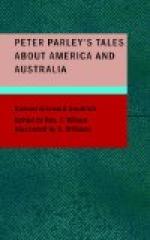Very fine roads have been formed in Australia, particularly one leading across the Blue mountains to Bathurst, on the western side of that range, which is 180 miles from Sydney.
The openness of the country around Bathurst is more favourable for hunting and shooting than most other parts of the colony.
The Kangaroo and the Emu are both hunted with dogs; they are both feeble animals, but they are not altogether destitute of the means of defence.
In addition to swiftness of foot, the Emu has a great muscular power in his long iron limbs, and can give an awkward blow to his pursuer, by striking out at him behind, like a young horse, while the Kangaroo, when brought to bay by the dogs, rests himself on his strong muscular tail, seizes the dog with his little hands or fore-feet, and thrusts at him with one of his hind feet, which is armed for that purpose with a single sharp-pointed hoof, and perhaps lay his side completely open.
[Illustration]
When hotly pursued, the kangaroo sometimes takes to the water, where, if he happen to be followed by a dog, he has a singular advantage over all other quadrupeds of his own size, from his being able to stand erect in pretty deep water.
In this position he waits for the dog, and when the latter comes close up to him, he seizes him with his fore-feet and presses him under water till he is drowned.
The Bustard, or native turkey, is occasionally shot in the Bathurst country. It sometimes weighs eighteen pounds, and is different from the common turkey, in the flesh of the legs being white, while that of the breast is dark-coloured.
Among the natives the old men have alone the privilege of eating the Emu, and married people only are permitted to eat ducks.
The natives suffer no animal, however small, to escape them.
One of the blacks being anxious to get an Opossum out of a dead tree, every branch of which was hollow, asked for a tomahawk, with which he cut a hole in the trunk above where he thought the animal lay concealed. He found, however, that he had cut too low, and that it had run higher up. This made it necessary to smoke it out; he accordingly got some dry grass, and having set fire to it, stuffed it into the hole he had cut.
[Illustration]
A raging fire soon kindled in the tree, where the current of air was great, and dense columns of smoke issued from the end of each branch as thick as that from the chimney of a steam-engine.
The shell of the tree was so thin, that I thought it would soon be burnt through, and that the tree would fall; but the black had no such fears, and, ascending to the highest branch, he waited anxiously for the poor little wretch he had thus surrounded with dangers, and devoted to destruction; and no sooner did it appear half singed and half roasted, than he seized upon it and threw it down to us with an air of triumph. The effect of the scene, in so lonely a forest, was very fine. The roaring of the fire in the tree, the fearless attitude of the savage, and the associations which his colour and appearance called up, enveloped as he was in smoke, were singular, and still dwell in my recollection. He had not long left the tree, when it fell with a tremendous crash, and was, when we next passed that way, a mere heap of ashes.




